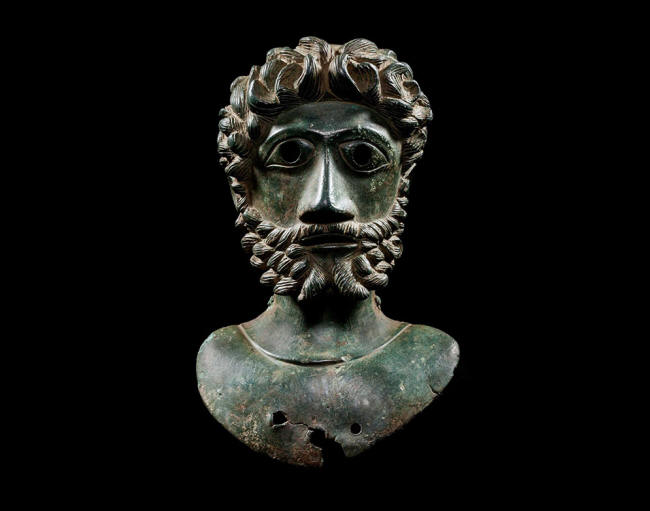|
A bust of Marcus Aurelius part of the Ryedale Hoard. Courtesy York Museums Trust
neuroscience and psychotherapy agree that you can change your mental framework as the Stoic Marcus Aurelius
described...
Empathy is a powerful social adhesive, one that most people believe helps us mediate forgiveness as it increases the likelihood of feeling together with someone who has hurt us.
But there are serious problems with
empathy, as the psychologist
Paul Bloom has argued.
Feelings of empathy arise unequally across situations, and people tend to empathize more with in-group members.
In negative settings,
Fortunately, empathy is not the most effective way to foster kindness and lenience.
The Stoic philosophy of the Roman emperor Marcus Aurelius offers a compelling alternative, one that bypasses the flimsy nature of empathy and focuses on finding equanimity instead:
At the imperial court, Marcus Aurelius witnessed the ancient world's most conniving social environment.
It was often challenging to maintain a moral high ground, so he frequently contemplated the theme of forgiveness, which he wrote about in his Meditations.
Adopting a Stoic framework, he focused on taking control of his own emotions and achieving tranquility independent of the social context:
Implementing these principles made Marcus Aurelius a righteous ruler.
Taking responsibility for our emotions - thereby constructing a resilient mindset that is unfazed by others' provocations - is a more practical way of building character than depending on empathy.
By focusing on our thoughts and actions instead of those of the perpetrator, we magnify our accountability to ourselves:
As neuroscience and psychotherapy suggest,
To explore the psychological act of forgiveness, we must first look at how anger is wired in the brain...
Biologically, anger is a fight-or-flight stress response.
But crucially, the emotional reactivity of the amygdala - which makes us lose our heads in anger, stress or fear - can be consciously regulated by our prefrontal cortex...
This brain area - involved in emotional regulation, behavioral control and complex decision-making - is always assessing what the amygdala is trying to convey to make sense of our situation.
In response, the cortex can either inhibit or amplify this more visceral and emotional signal.
Let's say you are at a concert, and someone steps on your shoe.
However,
So while we often blame the fast-acting, emotional amygdala for our anger, it is the cortex that regulates what we allow ourselves to feel and how we manifest that feeling.
This idea is summarized beautifully by Marcus Aurelius:
This is a critical notion to understanding the practical wisdom of Stoicism.
It means that,
Adjusting the value judgments in our cortex shapes the color of our soul.
Our emotional responses, like frustration or rage, are modulated by our minds, by how we frame our experiences...
Clear-mindedness, according to the Stoics, is the surest path to virtue.
And someone can become clear-minded only by understanding the Stoic principle often called the 'dichotomy of control':
They believed that most of our turbulent, fluctuating emotions arise from the refusal to accept what's beyond our control, as Marcus Aurelius points out:
To embrace this dichotomy means,
And this subjective veil over the objective event differs from person to person:
That is why Stoicism asks for personal accountability to gain control of our perceptions, weakening our trigger, shrinking our ego, and reducing our sense of entitlement by focusing only on ourselves.
As Marcus Aurelius writes:
This leads to an important choice in life.
We can either,
This perspective doesn't deny our right to feel emotions, but suggests examining how they shape our mind in a world that will inevitably cause more pain along the way.
This rationale of Stoicism - and its capacity to 'rewire' the brain through conscious thinking - is fundamental to modern psychotherapy.
In the 1950s, the pioneering psychologist Albert Ellis used Stoic philosophy to develop the first cognitive therapy called rational emotive behavior therapy (REBT).
As a predecessor and inspiration to the prevailing cognitive behavioral therapy (CBT), REBT is effective in treating various psychological disorders, including depression, anxiety, and anger issues - through methods that build value judgments, as well as healthier emotional and social responses based on Stoicism.
REBT emphasizes that irrational beliefs, and the way those beliefs influence how we think about our lives, are the main causes of our psychological distress.
It operates on the so-called 'ABC model'.
Echoing the Stoic dichotomy of control, the 'ABC' model suggests it is not 'A' (the event) that leads to 'C' (the consequence), but 'B' (our belief) that dictates how we end up feeling.
As Marcus Aurelius puts it:
If someone is easy to anger by others' innocent behavior, an REBT practitioner assists them in identifying their underlying cognitive distortions (like jumping to conclusions, over-generalization, or emotional reasoning) and helps them eliminate harmful beliefs through reframing and rationalizing.
In this Stoic school of life, clients are trained to appraise situations consciously, and behave accordingly, reducing both the frequency and the emotional intensity of their anger responses by strengthening their cortical control over the amygdala.
For Marcus Aurelius, Stoicism offered a framework to be more forgiving in the vileness of ancient Rome, keeping his emotions in check to be a wise and just ruler.
With the rising popularity of Stoicism, his ideas are resonating with people facing similar assaults on their sanity from contemporary society.
They are drawn to the empowering notion that the world and its events do not have to determine our feelings. Instead, following the example of REBT, we can actively work to 'rewire' our consciousness to rid ourselves of suffering.
Applying the dichotomy of control to find our cognitive distortions and regulate our emotions can lead not only to mental wellbeing, but also to something bigger than us.
As the emperor wrote:
|


